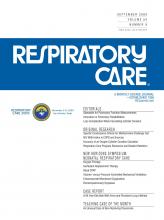Abstract
Extracorporeal membrane oxygenation (ECMO) is a form of cardiopulmonary bypass adapted for long-term use. Blood is drained from the patient, pumped through an artificial lung or membrane where gas exchange is augmented, and then re-infused back to the patient. ECMO provides support for the neonate with severe respiratory failure so that potentially deleterious ventilator settings can be minimized and the disease process given time to resolve. Survival rates and long-term neurodevelopmental outcomes in newborns supported with ECMO for hypoxemic respiratory failure remain favorable, although the use of ECMO has decreased in the most recent decade because of the availability of alternative treatment options.
Footnotes
- Correspondence: Peter Betit RRT-NPS FAARC, Department of Respiratory Care, Children's Hospital Boston, MA-661, 300 Longwood Avenue, Boston MA 02115. E-mail: peter.betit{at}childrens.harvard.edu..
Mr Betit presented a version of this manuscript at the New Horizons Symposium, “Neonatal Respiratory Care,” at the International Respiratory Congress of the American Association for Respiratory Care, at the 54th International Respiratory Congress of the American Association for Respiratory Care, held December 13-16, 2008, in Anaheim, California.
- Copyright © 2009 by Daedalus Enterprises Inc.







